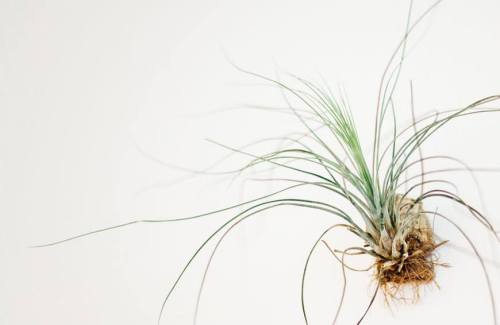The easy mistake most people make when it comes to caring for air plants
Despite their name, air plants do require water. Here, an expert tells us how to water air plants and keep them happy and thriving.

Air plants—aka tillandsia—are often touted as “un-killable” (lol, they haven’t met me yet). They’re one of the easiest plants to keep alive because they don’t require soil. One thing they do require, though: water. Yes, despite their nickname, they cannot survive on air alone. But, as has been previously established, I am a terrible plant mom and did not know this. I feel vindicated, though, because it turns out this is a very common misconception about air plants. For obvious reasons, you can’t water air plants like regular plants. So I turned to Ryan Lee, one of the founders of Rooted NYC—a Brooklyn-based plant shop that specializes in plants for city dwellers—to figure out how to water air plants.
“Rule number one: All plants need water,” Lee says. (I feel like it’s important to note that he emphasized the latter part of that sentence with clapping hands emojis to really drive the point home.) So yes, even though air plants are cute and rootless, they still need water. “All plants need water for photosynthesis (how they create food),” he explains. “Water is super important for this process because it’s what the plant trades in exchange for carbon dioxide, which is used to make food. This process of swapping water for CO2 is called transpiration and usually happens when sunlight is available.” Boom. Science.
Air plants grow on other plants and trees in the wild, which is how they’re able to gather their nutrients. “In absence of that though, like in your home, you need to provide the water to keep them alive,” Lee explains.
So how often do you have to water them? Lee says it depends, but generally, if the air plant is small enough to fit in your palm, you can mist it heavily once a week and be set. “For larger ones, you’ll want to start a bath in your sink and let them soak for 15-20 minutes once a week,” Lee says. (Side note: How adorable is it to give your plants a literal bath?) “The key, and really the one thing to remember, is to turn them upside down while they dry. Let Isaac Newton throw you a layup and let gravity do the work,” he says. This is very important, he explains, because otherwise water will pool in the crevasses of the plant and cause rot or mold. You can tell if your air plant isn’t getting enough water if the leaves curl inwards and downwards.
And unlike your snake plants and other desert plant children, air plants are not used to getting hours of direct sunlight. “Again, because air plants are epiphytes and typically grow on other plants and trees, they’re usually partially shaded or get filtered light,” Lee explains. “So, if your window faces East or North, put them as close to the light source as you can. If West and South, place them where they get strong, indirect light.” You can tell if your air plant is getting too much direct light if the tips start browning or crisping, he says. Oh, and don’t put them in front of your AC or heater—this stresses them out.
If you’re terrible at keeping plants alive (guilty), these are the hardest ones to accidentally kill. And to bring even more good vibes into your home, here’s how to Feng Shui your plants for love and wealth.
Sign Up for Our Daily Newsletter
Get all the latest in wellness, trends, food, fitness, beauty, and more delivered right to your inbox.
Got it, you've been added to our email list.








